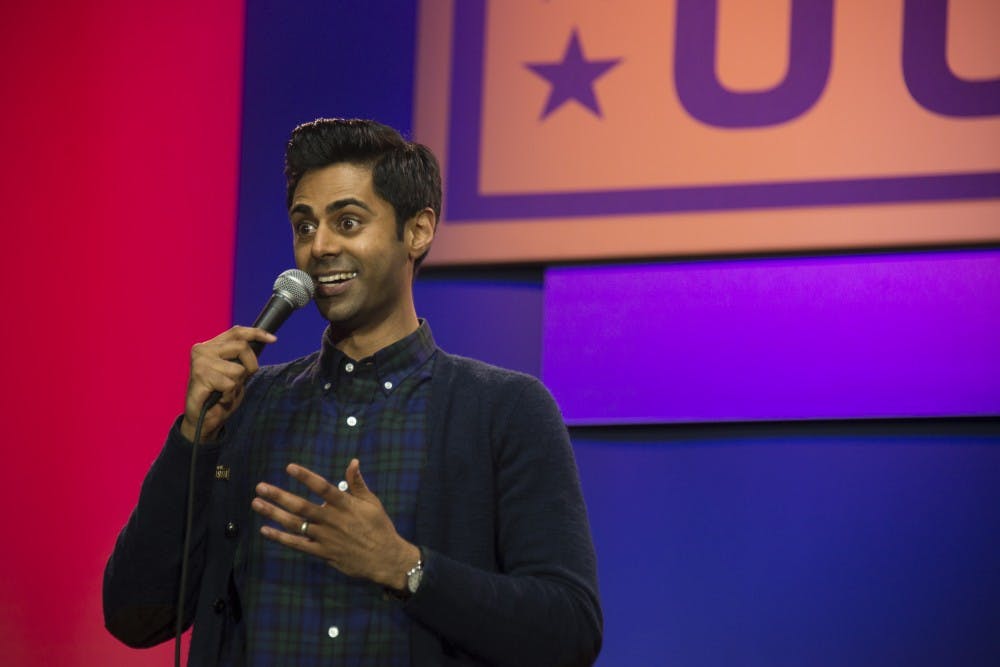Netflix released the third season of Marvel’s Daredevil, the second season of Castlevania and the debut of The Chilling Adventures of Sabrina this week in a slew of new shows. Among them was an unexpected surprise — Patriot Act with Hasan Minhaj.
The late-night show comes amidst an era in which late-night hosts have become more influential (and perhaps, more reliable) sources of news than news channels themselves. But with about a dozen late-night shows on air, with its myriad of Jameses, Jimmys and Johns, what is it that makes Patriot Act stand out (besides its ingeniously ironic name)?
In its trailer — which shows the government surveilling Minhaj — the show describes itself as one that “explores the modern geopolitical and cultural landscape through a comedic lens.” The show does this and so much more. What makes this show unique is a combination of its format, the issues it tackles and most importantly, its host.
Minhaj treats his new platform like a stand-up stage, albeit an informative one. He makes the entire episode the monologue that usually only marks the beginning of a show. He stands alone on stage, not behind a desk, and talks about a focused political issue for the entirety of the 20-30 minute episodes as if casually conversing with the audience. In its own words, “Patriot Act is a weekly comedy show that tackles the news with depth and nuance... and jokes. Lots of jokes.”
So far it has delivered on this promise by taking a deep dive into the complexities of the topics it covers. In doing so it conducts a thorough journalistic investigation into the matter. Unlike many of the shows of its genre, it goes beyond questioning one individual or dumping on the low hanging fruit of mainstream news (Trump). Instead, it challenges organizations and communities and discusses the implications of their actions.
In its first episode, Minhaj takes on the issue of affirmative action and the class-action lawsuit against Harvard University. Students for Fair Admissions (SFFA) is suing Harvard for alleged discrimination of Asian American applicants in college admissions and seeks to not have race considered in the admissions process. Minhaj voices his honest, staunch opinion on the topic, one that is barely getting the media attention it deserves, and declares the lawsuit’s claims as petty.
He reveals surprising facts about the lawsuit, particularly that it is being promoted and funded by Ed Blum, a white male legal strategist who has tried and failed to end affirmative action and is backed by the Trump administration. Moreover he calls out the Asian-American organizations and leaders who are allowing themselves to be used by Blum in such a way and, by doing so, selfishly ignoring the harmful consequences of their actions on other minorities.
The journalistic aspects and arguments are accompanied by witty remarks and topical zingers that not only entertain, but also cushion the facts of the case and make them engaging. Concerning the investigation into Harvard admissions, Minhaj says, “the DOJ [Department of Justice] is giving Harvard the type of thorough investigation they would never give victims of sexual assault.”
In the second episode, Minhaj moves to the topic of American relations with Saudi Arabia — a relationship that has confounded many by its ethically contradictory nature. He begins by discussing the case of journalist Jamal Khashoggi’s assassination that Saudi Arabia recently claimed responsibility for after much denial. He talks about the new monarch of Saudi, Sheikh Mohammed bin Salman (MBS), and points out how easily Americans were trapped by the crowd-pleasing PR moves made by MBS, such as legalizing driving for women and creating an image of a modern revolutionary leader.
By insinuating that perhaps this ignorance of the atrocities in Saudia Arabia (like the proxy war in Yemen and its support of militaristic and terrorist organizations) is really intentional denial, he reveals the economic stronghold the country has in America through its investments in many multinational companies.
At the end of the segment, Minhaj calls for a reevaluation of relations with Saudi Arabia, not only by the government but also by private organizations that remain willfully blind to the oppression of MBS. In a powerful conclusion he says, “To those who continue to work with him, just know that with every deal you close, you are simply helping entrench an absolute monarch under the guise of progress, because ultimately, MBS is not modernizing Saudi Arabia. The only thing he’s modernizing is Saudi dictatorship.”
Though Patriot Act is vastly informative and nuanced, one may wonder why this show is any different or better than John Oliver or Trevor Noah’s satirical news shows that also investigate deeply into lesser-known national issues. This is where Hasan Minhaj’s personality comes into play. Minhaj’s casual attire and conversational manner make the audience feel comfortable and close to the host. He doesn’t attempt to hide strong opinions on the topics he discusses, only supports them with evidence and facts. Neither does he shy away from his comic persona. He connects the issues to his own personal experiences and identity as a Muslim-Indian in America.
While speaking of affirmative action, he also speaks of Asian parents and their obsession with getting their kids into Ivy League schools. In relation to Saudi Arabia, he speaks of his connection to it as a Muslim because of the holy sites of Mecca and Medina. At the end of the second episode, he even jokes about Indians moving away from stereotypical professions such as doctors and engineers to criminal activities and dirty politics, claiming, “Trump employs more Indians than any show on television.” These personal connections give the show a relaxed vibe, a deeper connection to its audience and a unique perspective that no other show provides.
While the show only has two episodes out, it shows great promise, and I will surely be awaiting its new episodes every Sunday and will, hopefully, continue to be pleasantly surprised by it.





